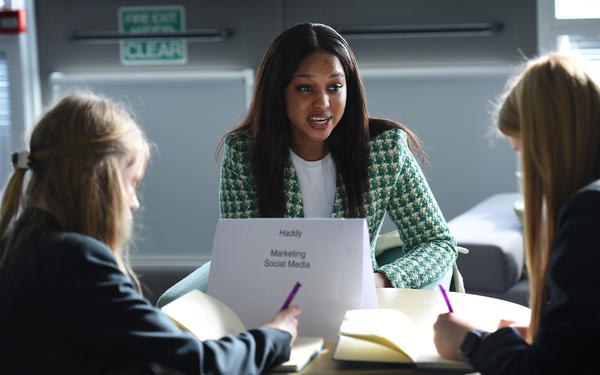Where can a career in publishing take you?
How do you get into a career in publishing and where can it take you? This Work in Publishing Week, two Cambridge University Press & Assessment colleagues talk about their career journeys and how a career in publishing has helped them to grow, develop and pursue their potential.

At Cambridge, our colleagues are supported and encouraged to grow and develop professionally, and with over 6,000 employees around the world working across publishing and assessment, there are many opportunities for colleagues to explore different career paths within our growing organisation.
As a global employer, we also believe we have an important role to play in helping to break down perceptions of our industry. Throughout the year we encourage young people to explore the careers we have to offer, and we are keen to give underrepresented communities insights into working in publishing and education. One of the ways we do this is through internships, as well as work experience and careers workshops for young people in our communities.
Work in Publishing Week (14 – 18 November 2022) is a national campaign from the Publishers Association that aims to inspire people to consider a career in publishing. This year, we invited students and their teachers from local secondary schools in Cambridgeshire to take part in a range of activities at our headquarters, with the aim of helping to demystify our industry and the roles we have to offer.
In a blog earlier this week, we shared the experiences of two of our colleagues working in technology roles at Cambridge. Here, we speak to two more colleagues, Yemaya and Haddy, about their careers in publishing and education.
Yemaya first worked at Cambridge as an intern before being offered a full-time job with us earlier this year, and Haddy has worked in several roles across our publishing and education teams.
Yemaya Marsden – Content Lead, Education
Yemaya is a Content Lead in Cambridge University Press & Assessment’s education publishing team. She is an in-house editor responsible for the writing and development stage of the publishing process. Her role involves reviewing various drafts and the final manuscript, providing feedback to authors along the way, and attending regular meetings with everyone involved in the project.
Many people just think of commissioning and editorial, but there are so many people involved.
How did you get into a career in publishing?
I have had quite the squiggly career! I have always wanted to work in publishing (particularly editorial) since Penguin Random House published my short story when I was sixteen years old. I have always loved reading and writing even before I started school. Unfortunately, there are not many opportunities to pursue a career in publishing in Northwest England.
I went to university and graduated with a BA (Hons) in English Literature. As a recent graduate, I became a journalist and wrote articles for newspapers in Manchester. After a while, I realised that newspaper journalism was not for me, so I started a PGCE, a postgraduate degree to train to be a primary school teacher. Although I loved working with children and broadening their minds, there were many aspects of teaching that no longer appealed to me.
In May 2022, I saw an opening for an internship at Cambridge University Press. This was finally my chance to get into publishing. I applied for the role of Content Development Assistant (basically an editorial assistant) with the education department. This would be the dream come true because I could finally combine my passion for editorial and education.
During the two-month internship, I quickly learned the role of a Content Lead (an in-house editor). I met people across the organisation while I worked in the University Printing House as well as remotely. I fell in love with the job and I have never worked within such a lovely team! Happily they offered me a full-time role as a Content Lead!
What skills do you need to work as a Content Lead?
You have to be very organised, have an excellent grasp of spelling and grammar, be quick to learn, be adaptable, and be outgoing.
You need to be able to juggle different projects in varying stages of development at the same time. One hour I am working on an A Level Physics coursebook, and the next I am discussing primary school computing at a project meeting. Good organisation is key to staying calm. You also need to be adaptable and quick to learn because there are lots of procedures to remember. It really helps if you are a people person because there are many people involved in the production of a book.
What is the best thing about working in publishing?
It is great to work with people who work in different areas of the publishing process. Many people just think of commissioning and editorial, but there are so many people involved in commissioning, planning, writing, developing, designing, marketing, and publishing a book.
What is one piece of advice you would give to someone who wants to get into a career in publishing?
Most people won’t work in editorial straight out of university, so you need to be resilient and keep building your skills.

Haddy Ndure - Corporate Communications Manager
Haddy first joined Cambridge as a receptionist before moving into a communications and marketing role in our Cambridge Partnership for Education team. She then had the opportunity to work in the Academic publishing division as a senior marketing executive and is now a corporate communications manager in our International Education team.
As corporate communications manager, Haddy is responsible for the team’s communications, and developing and implementing internal and external communications strategies that promote Cambridge Assessment International Education.
Haddy's role involves communicating and informing research, collaborating with the teaching and learning teams to communicate how Cambridge is supporting learners, teachers and improving our curriculum. She gets involved in writing speeches for senior leaders and thought leadership, including developing and collating case studies, and creating podcasts, video interviews, and blogs.
There are so many different areas within publishing and there is so much value in cross-collaborating across departments and teams.
How did you get into a career in publishing?
My background is in journalism. I worked at ITV News after graduating from Leicester, and before that I’d done various internships at the BBC including BBC Newsround, BBC World Service and BBC Radio Cambridgeshire while at University. I also did several unpaid jobs at community radio stations and an online TV station called, 'Africans in London TV', mostly presenting news and entertainment content.
My career in publishing was unplanned, but I am so pleased to be where I am. I find myself using the same skills I developed as a journalist in my current work in marketing and communications, and I really like it because it gives an edge and a point of difference to the work I produce. Because I am comfortable and experienced in talking to people from all parts of the world, it means I bring innovative ideas to how we communicate as a publisher.
What skills do you need to work in communications?
I believe you need confidence, you need empathy and you need respect and an understanding of different cultures. A lot of the time, you are speaking to a number of people and driving ideas and messages, so you need buy in from your colleagues. When your confidence is activated, you can get people to believe in you, in the messages you want to communicate and what that will look like.
Similarly, because you are communicating externally to groups of people, it’s imperative to have enough empathy to be able to put yourself in their shoes. For instance, when writing to schools in times of crisis, you want to reassure them and give them the confidence that they are in good hands with Cambridge.
What is the best thing about working in publishing?
Definitely the people. I have met and connected with so many incredible people at Cambridge University Press & Assessment over the past three-and-a-half years that have contributed to my growth and development and are just fun to be around.
I also like the different initiatives I can get involved with at work to truly make a difference. I am part of our Academic marketing working group on diversity and inclusion where we look at the way we do marketing and think of how we can make it more inclusive. We organise events, invite speakers, we produce guidelines, marketing checklists, and areas or actions people should be aware of to ensure our marketing represents all the communities we serve. Work like that is close to my heart and I love being able to do it as part of my job. It is great to contribute to the organisation in this way and help make Cambridge University Press & Assessment a better place to work for everyone.
What is one piece of advice you would give to someone who wants to get into a career in communications?
Find out as much about your customers, colleagues and markets as you can. Be creative and innovative, it makes your content stand out, original and memorable. Step outside of your comfort zone and collaborate. There are so many different areas within publishing and there is so much value in cross-collaborating across departments and teams.
To learn more about what it is like to work at Cambridge and to discover opportunities to pursue your potential with a career in publishing and education, visit our careers page.




